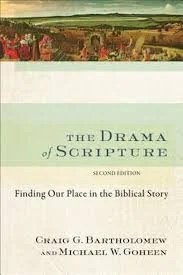Te Paipera Tapu - A Story Leading to Jesus: Week 1
How do we read the Bible for all it’s worth?
Opening Prayer:
Lord God,
We thank You for Your Word, embodied in Jesus, revealed in scripture.
May Your word take deep root in our lives, penetrating to the very depths of our being and transforming us every day.
Illuminate our hearts and minds as we explore Your Word, as we seek to understand and apply its teachings in our lives.
In Jesus’ name,
Amen
Key Scriptures:
17 “Do not think that I have come to abolish the Law or the Prophets; I have not come to abolish them but to fulfill them. 18 For truly I tell you, until heaven and earth disappear, not the smallest letter, not the least stroke of a pen, will by any means disappear from the Law until everything is accomplished. 19 Therefore anyone who sets aside one of the least of these commands and teaches others accordingly will be called least in the kingdom of heaven, but whoever practices and teaches these commands will be called great in the kingdom of heaven. 20 For I tell you that unless your righteousness surpasses that of the Pharisees and the teachers of the law, you will certainly not enter the kingdom of heaven.
Matthew 5:17-20
14 But as for you, continue in what you have learned and have become convinced of, because you know those from whom you learned it, 15 and how from infancy you have known the Holy Scriptures, which are able to make you wise for salvation through faith in Christ Jesus. 16 All Scripture is God-breathed and is useful for teaching, rebuking, correcting and training in righteousness, 17 so that the servant of God may be thoroughly equipped for every good work.
2 Timothy 3:14-17
Sermon Summary:
Our new series is called Te Paipera Tapu: A Story Leading to Jesus. In it we will be investigating how to read the Bible for all it’s worth, with the goal of learning how to love Jesus more. We have the Bible, the record of God’s Word to us, but how are we meant to read it? How do we get the most out of it? How do we hear what God is saying through it?
To begin to answer these questions we thought it best to start with Jesus - how did Jesus himself approach scripture? He himself claimed that He had come, not to abolish the law and the prophets, but to fulfil them. Jesus approaches scripture with reverence. Jesus knew the law and prophets (a shorthand phrase for all of the Hebrew bible) better than anyone, and He showed people what it looks like when scripture is actually embodied and lived out. The Bible is full of encouragement and hope, but it can also be confusing, perplexing, horrifying, off-putting. Jesus says all of it is important; not just the happy hopeful parts, not just the part we like – all of it. God speaks through all of scripture, even if we find it difficult to understand.
Jesus also approaches scripture as human and divine. The Bible was written down and edited by people in particular times and places. It is a human document. But it is also a divinely inspired document. In these writings the Holy Spirit is at work. God prefers to work with human beings, and in human beings. Scripture itself is full of instances where God partners with human beings and works with them and in them to achieve His purposes – so much so He even became human too.
Jesus approaches scripture contextually. The Bible isn’t just one thing, one type of literature. It contains many different genres and types of writing. Narratives, poetry, wisdom literature, letters, law codes – all different, but all God’s word. We must ask ourselves for any given text we read; what is God, through this particular author in this particular text, intending to say? What does the text say and how does it say it? What did it say to its original audience and what does it say to us now?
Jesus approaches scripture as a true story that leads to Him. Scripture points to Jesus, it heralds His coming, it prepares the world for Him. It relates the story of His coming, His continuing presence with His people, and the meaning of His death and resurrection with the future that we have in Him. The story of God has the power to transform us as we find our place in it. In the Bible we meet Jesus, we meet God. Yes, it is sometimes strange and bewildering. But that is why we read it together, that is why scripture must have its place in the community of God’s people. The Bible doesn’t give up its gifts all at once. It takes a lifetime of reading, study, and devotion – together.
Below is a video from the Bible Project on what is the bible. We trust it’ll be helpful for you as you unpack this further together in community.
Questions to Consider:
What is the Bible? Why do we read it?
In what way do you approach the Bible? What is the reason for studying scripture?
How important is scripture to you? How/to what extent is your life shaped by it?
How do the diverse genres of poetry, letters, law texts, and wisdom writings complement the narrative texts and thus contribute to our overall understanding of the overarching story? Why the diversity of genres?
What is the value in God revealing God’s self through texts spread out over 1000 years and written by different authors?
Does this story continue on in Christian believers today? If so, how? If not, what is fundamentally different between the story of the Bible and the story of the Church as lived out today?
What differences do you see between reading scripture, studying scripture and meditating on scripture?
Practices to Consider:
Read the following passage and spend time meditating on it, letting God speak to you through it:
1 Blessed is the one
who does not walk in step with the wicked
or stand in the way that sinners take
or sit in the company of mockers,
2 but whose delight is in the law of the Lord,
and who meditates on his law day and night.
3 That person is like a tree planted by streams of water,
which yields its fruit in season
and whose leaf does not wither—
whatever they do prospers.Psalm 1:1-3
Prayer Prompts:
Pray that we may meet the Spirit more and more as we encounter scripture, and that we might be formed into people like Him, able to join God more and more in His work of redeeming the world.
Additional Resources:
Recommended Reading:





